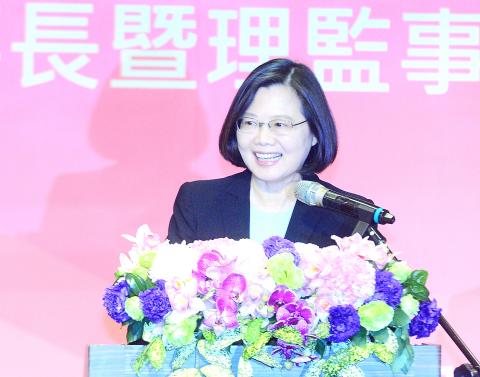President Tsai Ing-wen (蔡英文) said in a recent interview with CNN that her decision on whether to accept an invitation to address the US Congress would depend on three major considerations.
While ties with the US improved after US President Donald Trump took office in January 2017, in the interview with CNN correspondent Matt Rivers on Monday, Tsai said that it was not a simple decision to make and would require “comprehensive consideration.”
“From our perspective, would we accept such an invitation if it were extended? We would have to look at it from several angles,” Tsai said.

Photo: Wang Yi-sung, Taipei Times
Tsai laid out three major considerations: “Would delivering an address in Washington DC be in the interests of Taiwan, benefit Taiwan-US relations, and serve peace and stability in the region?”
On Feb. 7, a group of US senators wrote a joint letter to US House of Representatives Speaker Nancy Pelosi, calling on her to invite Tsai to address a joint session of the US Congress.
The letter was signed by Cory Gardner, Marco Rubio, Tom Cotton, John Cornyn and Ted Cruz.
Some US politicians have opposed the proposal, with former American Institute in Taiwan chairman Richard Bush saying that it was flawed, as it would not be conducive to US relations with China and would hurt Taiwan.
Former US deputy assistant secretary of state Susan Shirk even said the proposal was a “huge mistake,” adding that it would be highly irresponsible for Trump to use Taiwan as leverage in dealing with China.
Tsai, who came to power in May 2016, also said in the interview that she intended to seek re-election next year.
According to CNN, Tsai, throughout the interview, painted the picture that Taiwan was facing down the growing might of China.
Last month, Chinese President Xi Jinping (習近平) called for the peaceful unification of China and Taiwan, but declined to discount the use of force.
“Chairman Xi Jinping’s New Year’s address alerted Taiwan to the fact that its independent existence could be changed, because Xi has started to talk about unification and the ‘one country, two systems’ concept,” Tsai told CNN.
When asked “if China invaded tomorrow, would you count on the US military to be there?” Tsai said that Taiwan has been strengthening its military capability.
“Our defenses are well-prepared for an attack at any time — for any situation where we would need to fend China off for 24 hours,” Tsai said. “So we would hope that after withstanding any first wave of attacks ourselves, other countries throughout the world would stand up in unison and put strong pressure upon China in response.”

Taiwan would welcome the return of Honduras as a diplomatic ally if its next president decides to make such a move, Minister of Foreign Affairs Lin Chia-lung (林佳龍) said yesterday. “Of course, we would welcome Honduras if they want to restore diplomatic ties with Taiwan after their elections,” Lin said at a meeting of the legislature’s Foreign Affairs and National Defense Committee, when asked to comment on statements made by two of the three Honduran presidential candidates during the presidential campaign in the Central American country. Taiwan is paying close attention to the region as a whole in the wake of a

President William Lai (賴清德) has appointed former vice president Chen Chien-jen (陳建仁) to attend the late Pope Francis’ funeral at the Vatican City on Saturday on his behalf, the Ministry of Foreign Affairs said today. The Holy See announced Francis’ funeral would take place on Saturday at 10am in St Peter’s Square. The ministry expressed condolences over Francis’ passing and said that Chen would represent Taiwan at the funeral and offer condolences in person. Taiwan and the Vatican have a long-standing and close diplomatic relationship, the ministry said. Both sides agreed to have Chen represent Taiwan at the funeral, given his Catholic identity and

Chinese Nationalist Party (KMT) Chairman Eric Chu (朱立倫), spokeswoman Yang Chih-yu (楊智伃) and Legislator Hsieh Lung-chieh (謝龍介) would be summoned by police for questioning for leading an illegal assembly on Thursday evening last week, Minister of the Interior Liu Shyh-fang (劉世芳) said today. The three KMT officials led an assembly outside the Taipei City Prosecutors’ Office, a restricted area where public assembly is not allowed, protesting the questioning of several KMT staff and searches of KMT headquarters and offices in a recall petition forgery case. Chu, Yang and Hsieh are all suspected of contravening the Assembly and Parade Act (集會遊行法) by holding

Lawmakers from the Democratic Progressive Party (DPP) yesterday established a friendship group with their counterparts in Ukraine to promote parliamentary exchanges between the two countries. A ceremony in Taipei for the Taiwan-Ukraine Parliamentary Friendship Association, initiated by DPP Legislator Chen Kuan-ting (陳冠廷), was attended by lawmakers and officials, including Deputy Minister of Foreign Affairs Francois Wu (吳志中) and European Economic and Trade Office in Taiwan Director Lutz Gullner. The increasingly dire situation in Ukraine is a global concern, and Taiwan cannot turn its back when the latter is in need of help, as the two countries share many common values and interests,